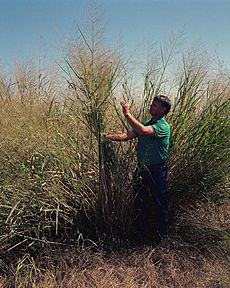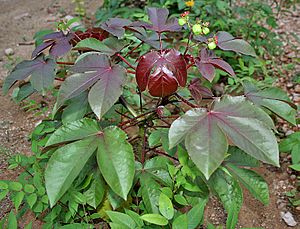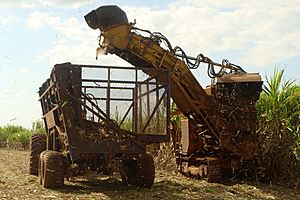Sustainable biofuels facts for kids
Biofuels are special fuels made from plants. They are different from gasoline or diesel, which come from oil deep underground. Biofuels can help us use less oil and keep fuel prices more stable. It's important that we make biofuels in a way that is good for the planet and for people. When done right, biofuels can help countries in Africa, Latin America, and Asia grow their economies.
Contents
What Are Biofuels?

There are many types of biofuels. Some common ones are ethanol and biodiesel. These are made from plants we also use for food, like wheat, maize (corn), sugar cane, palm oil, and oilseed rape. If we use too much of these food crops for fuel, it can mean less food is available or food prices go up. This is sometimes called the "food vs. fuel" problem.
Scientists are now working on second-generation biofuels. These are made from parts of plants that we don't eat, like the stalks, leaves, and wood. They come from special energy crops, forest materials, or even leftover plant waste from food production. New ways of making these biofuels are helping to make them even better for the environment and more efficient.
Experts like Lord Ron Oxburgh say that making biofuels in a responsible way is key. If done well, biofuels can be a good energy source that doesn't take land away from growing food or harm nature. They can also help use up waste from our societies and create new jobs for people. But if they are made without care, they might not help the climate and could even cause problems for people and the environment.
The Rocky Mountain Institute agrees that good biofuel production should not hurt food growing, cause water problems, or damage nature. Instead, it can even make soil healthier. Choosing the right land to grow biofuel crops is very important. We need to avoid using the best farmland that is needed for food.
Plants for Sustainable Biofuel
Jatropha in India and Africa

Some plants, like Jatropha, are great for making biodiesel because they can grow on land where other plants or trees don't grow well. This means they don't compete with food crops. Growing Jatropha also helps local communities.
It takes a lot of people to plant Jatropha and pick its fruits by hand, which creates many jobs. In parts of rural India and Africa, this has given work to about 200,000 people. Also, villagers can often grow other crops in the shade of the Jatropha plants. This helps communities avoid buying expensive diesel fuel, and they might even have some biofuel left to sell to others.
Jatropha in Cambodia
Cambodia doesn't have its own oil. It has to buy almost all its diesel fuel from other countries to make electricity. This means Cambodians often pay very high prices for energy, which can make it hard for their economy to grow.
Biofuels could be a great solution for Cambodia. They can be made locally, cost less, and don't depend on world oil prices. Making and using biofuel in Cambodia could also make their energy supply more secure, help rural areas develop, and be good for the environment. The Jatropha curcas plant is especially good for this because it already grows commonly in Cambodia. Local biofuel production from Jatropha or other plants could bring many benefits to investors, the economy, local communities, and nature.
Sweet Sorghum in India
Sweet sorghum is another good plant for biofuels that avoids many problems. With sweet sorghum, only the stalks are used to make fuel. The grain can still be used for food or animal feed. It's not a highly demanded food crop globally, so it doesn't affect food prices much. Sweet sorghum grows on dry farmlands that don't store much carbon, so there's no worry about cutting down rainforests to grow it. It's also easier and cheaper to grow than other biofuel crops in India and doesn't need irrigation, which is important in dry areas.
Working Together on Biofuels
Roundtable on Sustainable Biofuels
It's important for everyone to talk and work together to make biofuels successful. This includes farmers, companies, governments, non-profit groups, and scientists. The Roundtable on Sustainable Biofuels is an international group that brings these people together.
In 2008, this group created a set of rules and ideas for how to produce and share biofuels in a sustainable way. They called it "Version Zero" of their standards. These rules help make sure biofuels are good for people and the planet.
Sustainable Biofuels Consensus
The Sustainable Biofuels Consensus is another international group. They ask governments, businesses, and others to work together to make sure biofuels are traded, used, and produced in a sustainable way. They believe that biofuels can help change how we get energy, fight climate change, and bring new life to rural areas around the world.
This group imagines a world where land provides food, animal feed, materials, and energy. They see a future with more jobs in rural areas, different ways to get energy, healthier natural places, protected wildlife, and less carbon in the air.
How Biofuels Help with Oil Prices
Biofuels can help create real competition in the energy market and keep oil prices from getting too high. According to the Wall Street Journal, if we didn't have biofuels, crude oil would cost about 15% more, and gasoline could be 25% more expensive. Having a good supply of energy from different sources, like biofuels, helps stop big jumps in gasoline prices.
Biofuels and Sustainable Transport
Biofuels can't replace all fossil fuels on their own. They are not a "magic solution" for reducing pollution from cars and trucks. Biofuels need to be part of a bigger plan for sustainable transport. This plan should also include other renewable energy sources, using energy more wisely, and reducing how much we need to travel overall. Things like hybrid and fuel cell cars, public transportation, and better city planning are all important parts of this bigger picture.
Images for kids
-
Sugarcane (Saccharum officinarum) plantation ready for harvest, Ituverava, São Paulo State, Brazil.
-
Cosan's Costa Pinto sugar cane mill and ethanol distillery plant at Piracicaba, São Paulo, Brazil.
-
Location of environmentally valuable areas with respect to sugarcane plantations. São Paulo, located in the Southeast Region of Brazil, concentrates two-thirds of sugarcane cultures.
-
Pongamia pinnata seeds in Brisbane, Australia.






